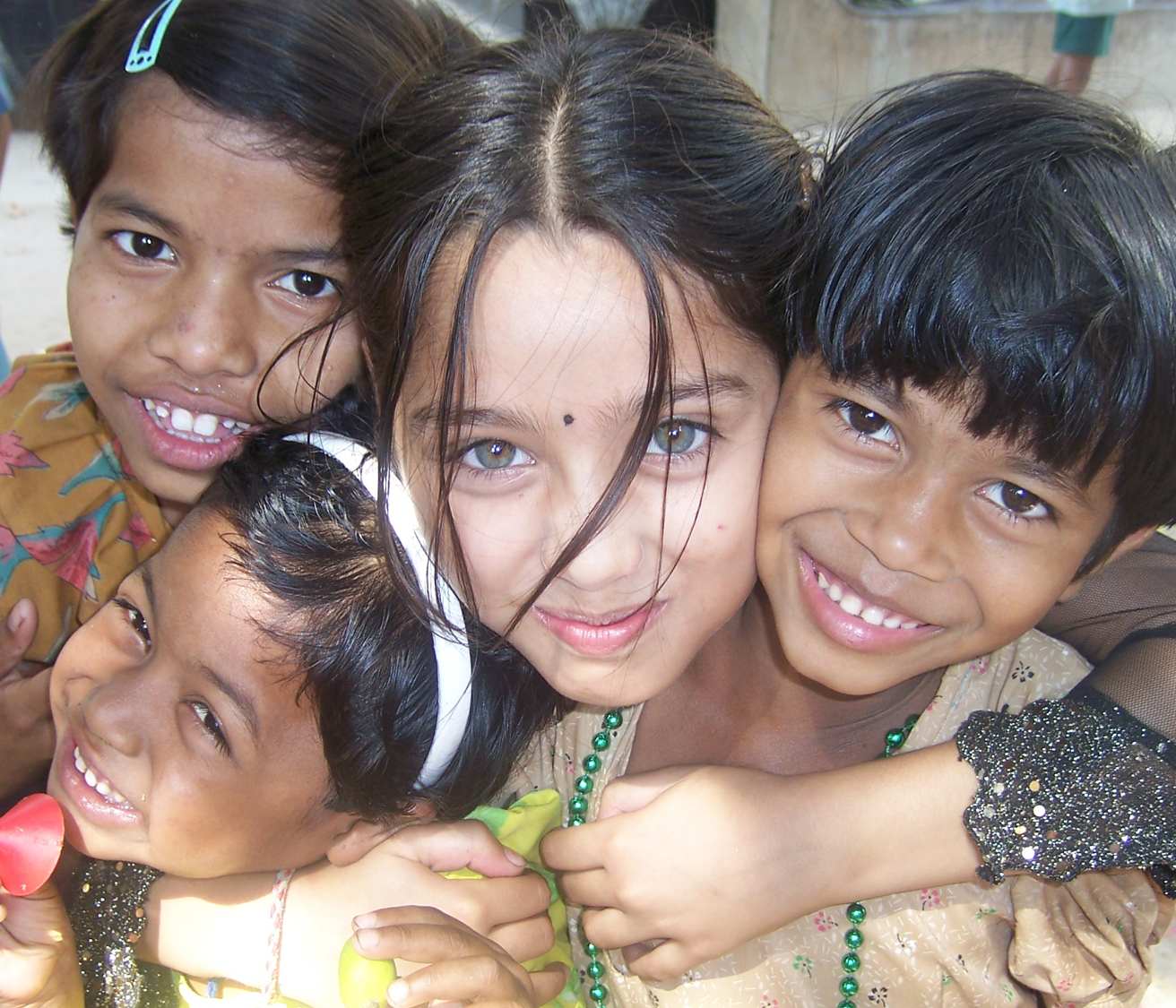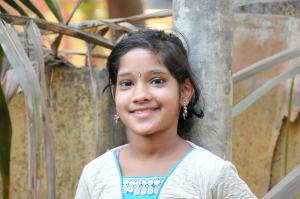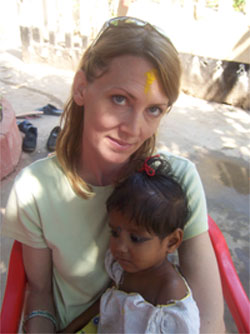Once in a while, we run across someone whose life purpose has impacted so many people - it is so inspiring to find these! Our India Editor, Caitie Whelan, was instrumental in creating the Merasi School, helping low-caste Merasi Indians get education and pull themselves out of poverty. We've found another person who has changed the lives of so many in India - Shelley Seale. Shelley is the author of The Weight of Silence: Invisible Children of India - and today is the publication date of this new book!

Dog’s Eye View Media proudly presents a true-life story straight from today’s headlines. Shelley Seale’s narrative non-fiction book follows the lives of just such children as those brought to life in the movie Slumdog Millionaire. The Weight of Silence: Invisible Children of India depicts Seale’s journey into orphanages and through the streets and slums of India where millions of innocent children live without families. During her three years of writing The Weight of Silence, Seale has befriended and told the stories of many such children – and has born witness to their struggles first hand. Foreword by Joan Collins.


We're the first stop on Shelley's Virtual Book Tour, and are very proud to sit down and talk with her about her new book, the Weight of Silence, children, changing lives, helping others, and more. Here's what she had to say...
WE: What is your new book about?
SS: By now, everyone had either seen, or at least heard of, the movie Slumdog Millionaire, about the lives of two brothers who come from the slums of Mumbai – made even more desperate after they are orphaned. What many don’t know, however, is that for 25 million children in India, the harsh world depicted in the movie is their everyday reality. Yes, that’s 25 million kids who have been orphaned, abandoned or trafficked. My book, The Weight of Silence: Invisible Children of India, follows my journey over the past four years into the streets, orphanages and slums of India where these children live without families or homes of their own. I became immersed in their world, a witness to their struggles – but also their joys, their incredible hope and resilience that amazed me time and time again. The ability of their spirits to overcome crippling challenges inspired me. My sole purpose in writing this book was to give these millions of children a voice that could be heard by others in the world who, I was convinced, would be as moved by their plights as I was.

WE: What is the Weight of Silence?
SS: I actually came up with the title of the book about six months after I started writing it. I always knew that the subtitle would be “Invisible Children of India,” because these kids are so largely ignored by society and the world that they are virtually invisible. But I knew that wasn’t the whole title.
One of my favorite quotes of all time is that of Dr. Martin Luther King, Jr, who said, “Our lives begin to end the day we become silent about things that matter.” One day I was on a plane, on the way to India. I had fallen asleep, and when I woke up the title was just in my head. The Weight of Silence. Perhaps I had Dr. King’s words in my subconscious, because I realized that to remain silent about things that are of such vast importance is like a weight on our lives, our souls, our very humanity.

WE: When did you first go to India, and why?
SS: One day in early 2004 I was paging through a local magazine when an article grabbed my attention. It told the story of Caroline Boudreaux, who had visited India three years earlier and happened upon an orphanage full of children living in incomprehensible conditions. She had returned home and started the Miracle Foundation, a nonprofit which raises money and recruits sponsors to help support the home. I began volunteering for the organization and sponsored a child, and Caroline invited me to go to India with a volunteer group. My first visit was in March 2005.



WE: How did you first start thinking about writing this book?
SS: When I arrived that first time, I assumed all the kids there were orphans in the true sense of the word – their parents had died. Instead I was shocked by how many of them had been “orphaned” by poverty; their parents had left them at the Miracle Foundation home because they were too poor to feed them, which in some ways seemed an even greater tragedy. I wondered when each of them had stopped wanting to go back home, or if they ever had. Many of them had also been affected by other issues such as disease or child labor and trafficking; some had been found living on the streets.
As I bore witness to the harm that lay in each of them because of their pasts, as I discovered the stories behind the faces and the names, there was simply no way to go on with my life afterwards as if they did not exist. So I embarked on a three-year journey researching the issues, traveling throughout India and talking to many professionals and those working in the trenches to uphold these children’s rights and improve their futures. I could see that they were “invisible” children, without a real voice of their own.

WE: How can travelers give back?
SS: I think that first and foremost, being aware of the culture they are visiting and how travel impacts peoples and places is very important to travelers making their journeys in a way that will have positive impact, and not negative. Making conscious choices when we plan our travels, and when we are in new places, makes all the difference in the world. There are so many ways in which travel can harm the planet as well as local people; but there are also many ways in which we, as travelers, can avoid those pitfalls and contribute to the people and places of our global village.
Some of the ways are quite small and easy – travelers do not need to feel a sense of guilt, like if they don’t have two weeks to go volunteer somewhere, they can’t do anything. For example, there’s a terrific organization called Stuff Your Rucksack. They offer a forum where nonprofits can post needs that they have for donations all over the world, and you can check these lists when you travel - and stuff your rucksack (or backpack or luggage) with some of these items to take with you! I think it's a terrific example of grassroots initiative - people are traveling everyday to the places where things are badly needed.
There are many other great resources for people who wish to travel thoughtfully – and the good news is that traveling in this way ultimately creates such a richer, more meaningful experience for the traveler. In the end, you connect with nature, historical places, and local people in a much deeper way that you would by just going along the worn tourist trail without giving it much thought. You can bring home a lot more than souvenirs from traveling with a purpose. Some of these resources are:
Voluntourism: http://www.voluntourism.org/
The International Ecotourism Society: http://www.ecotourism.org
National Geographic’s Sustainable Travel: http://travel.nationalgeographic.com/travel/sustainable/index.html
Global Travel International: http://www.gvi.co.uk/
The Better World Shopping Guide: http://www.betterworldshopper.com/
WE: When faced with such poverty need, how can some of these children thrive and pull themselves out of their situations?
SS: Quite honestly, the only way the vast majority of them will ever be able to is when enough caring adults work to ensure that their rights are upheld. When the world decides to take notice of them. Children are entitled to the basic rights of water, food, medical care, a home, and an education – simply by birth. They are also, in my opinion, entitled to a childhood.
The reality is that most children living in such desperate circumstances, anywhere in the world, lack any sort of meaningful ability to pull themselves out of those circumstances without our assistance. When enough people decide to work together to uphold their rights, amazing things can be done. Caroline Boudreaux, the founder of the nonprofit Miracle Foundation – whom I first traveled with to India – drove that point home to me with her belief that it shouldn’t be done due to charity, just because we feel sorry for these kids. They have certain rights by birth – other people in the world have the ability to ensure those rights. It is, really, a simple calculable solution – and a moral imperative.

WE: How can we help?
SS: If anyone wants to get involved with The Miracle Foundation, they can do so by visiting www.miraclefoundation.org. This is the nonprofit that I originally got involved with, and where I met these children for the first time in India. Through them you can travel on a volunteer trip to the orphanages like I did; sponsor a child; donate; volunteer; or even buy school books or a mosquito net for a child.
But you know, it doesn’t have to be India, and it doesn’t have to be these kids. That is my passion, of course, but my biggest piece of advice for people who are truly interested in making a difference is to figure out what YOU are passionate about, and then find a way to help with that cause. For someone else, it might be the rainforest or women’s development in Sudan or clean drinking water in rural South America. The point is, just do something.

WE: How did you involve your daughter in your work?
SS: When I first went to India in 2005 and the idea for this book was planted, my daughter Chandler was a 14-year-old junior high student. Like most typical teenagers, she paid little attention to my volunteer work with the Miracle Foundation – until I actually went to India.
When I returned, Chandler was pretty excited and enthralled by my photographs and the stories I told her. That fall she started at a new high school that was very progressive, featuring a Global Citizen class and a spring “project week,” in which students were given a week off regular class schedules to complete a project of their own design. Some students made videos or art projects, others did community service. Between the school’s focus on social and political issues and living in Austin among a set of friends with broad viewpoints of the world, Chandler decided that her project week would be India – going on the volunteer trip and compiling a photo journal of the experience.
Chandler already had a broader sense of the world than I had at her age, and a compassionate nature. I yearned to foster that seed in her. I thought, what an incredible blessing it would be for a person to grow into adulthood without the blinders, without the sense that the small corner of the world she knew was the only one there was. I knew she would be enriched by the experience, and I also knew it was a gift she would not take lightly. And so I returned to India exactly one year after my first trip, with Chandler in tow. It was such an amazing journey for both of us. The look on her face our first day with the children beat any day I had ever spent with her in my life, after the day she was born. She never once complained about the heat, the dirt, the food, the place we stayed…you have to know that this was not Mumbai, this was a tiny, poverty-stricken, rural village. She didn’t want to come home and cried when we left – as we drove away from the orphanage on our last night, at the hotel, on the airplane.

WE: What do you hope the readers “take away” from your book?
SS: Two things. First of all, that even though the topic is serious and the stories often heartbreaking, it is not a depressing book or subject! These kids, and their stories, are incredible and awe-inspiring, hopeful and inspirational. In my journeys over the last three years into the orphanages, slums, clinics and streets of India I have become immersed in dozens of children’s lives. Their hope and resilience amazed me time and time again; the ability of their spirits to overcome crippling challenges inspired me. Even in the most deprived circumstances they are still kids – they laugh and play, they develop strong bonds and relationships to create family where none exists; and most of all they have an enormous amount of love to give. The issues are tough, what has happened to a lot of these kids makes you want to cry – but the bottom line of their stories is a very strong, hopeful voice.
Second, just to get involved and do something; to realize that just a little bit can move mountains. Too often, I think the natural inclination of most of us in the face of some of the large problems in the world is to become overwhelmed and throw up our hands in despair. They seem insurmountable. But the truth is, the smallest actions can make the biggest difference in just one person’s life, and if you can affect one person’s life, it is the world to that person. Most of us could never sell all our belongings and go work in the trenches in India, but that doesn’t mean we should think, then, that we can’t do anything at all. Amazing things can be done that aren’t difficult at all. A reader doesn’t even have to come away from my book and do something about India – I think the key is to discover what you are passionate about, what you have genuine feelings and caring about – and then do something about that issue. But just do something.
WE: If you could ask people reading this to do one thing, what would it be?
SS: Give these children a voice by reading their stories. And, as I said, find the something that is “your thing” and take action to make a difference in someone’s life. Remember, in the words of Dr. Martin Luther King, Jr.: “Our lives begin to end the day we become silent about things that matter.”

The first night I ever met these children - March 12, 2005
WE: What's next for you?
SS: A break! But seriously, I am still doing a lot of freelance writing, mostly on topics of sustainable travel and nonprofit/social issues around the world. I am just starting a project for National Geographic’s GeoTourism map for the Central Cascades; I am one of the writers on the project. But I already have an idea for another book in my mind, about people around the world who are truly changing the world, with ONE big idea. I have met so many of these sorts of people, each with an incredible and inspiring story, and so I’ve thought of compiling those into a sort of anthology. I never get tired of writing, and I never get tired of hearing about the good that can be done when enough caring people take action.
WE: Thanks so much, Shelley. I am so impressed with your work and can't wait to read your book. Wandering Educators - check back later this month for our author interview and book review of The Weight of Silence.
For more information on The Weight of Silence: Invisible Children of India, please see:
http://weightofsilence.wordpress.com
Release Date: June 15, 2009
ISBN: 978-0-9802323-7-0
All photos courtesy and copyright of Shelley Seale.
